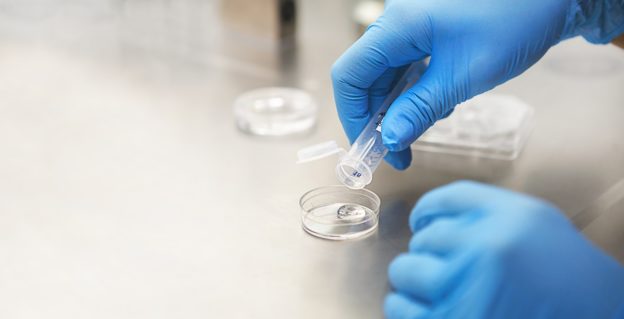What is intracytoplasmic sperm injection?
Intracytoplasmic sperm injection (ICSI) is an assisted reproductive technology (ART) procedure for infertility treatments. It is commonly used to increase the chances of fertilization due to sperm-related issues or failed in vitro fertilization attempts.
How does ICSI work?
Essentially, ICSI involves injecting a single sperm directly into the egg during in vitro fertilization. This method is particularly useful for couples who struggle with male infertility issues, such as low sperm count or motility. After the sperm is retrieved from the male partner, it is prepared in a laboratory before being injected into the egg. This ensures that only the healthiest and most viable sperm are selected for the fertilization process. Once the sperm and egg have been successfully fused, the embryo is monitored for growth and development, ultimately leading to a successful pregnancy and the birth of a healthy baby.
Who is a candidate for intracytoplasmic sperm injection?
ICSI can be a solution for many dealing with severe male infertility issues. Those who may benefit from the procedure include but are not limited to men with a ejaculation dysfunction, low sperm count, motility, or with poor sperm morphology. Other ideal candidates are couples who have had several
failed IVF attempts, are using frozen sperm or eggs, or females who are diagnosed with severe
endometriosis. Men who have undergone a reversed vasectomy may also see fertility success with ICSI.
What is the success rate for ICSI?
ICSI can increase a couple’s chance for a successful birth. The intricate procedure offers 50% to 80% success rate for fertilization, depending on the woman’s age and lifestyle habits. Women under 35 years old have a 49% chance for a live birth while those in their early 40s may have only a 29% chance.
Is ICSI different from IVF?
Yes and no. ICSI is a form of in
vitro fertilization (IVF). While the two procedures share the same goal, the techniques are very different. With ICSI, the sperm is injected into the egg while IVF involves placing the sperm in a petri dish near the egg for fertilization.
Read More: Conventional IVF Insemination vs. ICSIWhat are the risks associated with ICSI?
A small percentage of the eggs injected can be damaged by the needle during the procedure. In reference to a successful pregnancy, abnormalities with the sex chromosome can be prevalent, although there are no valid studies to the cause. With these abnormalities, there is a risk of miscarriage, severe heart problems of the infant, an increased risk of childhood learning disabilities, and or behavioural problems, and a risk for infertility issues for the child into adulthood.
What are the benefits of ICSI?
ICSI offers a potential increase success rate to
male infertility issues seen with sperm-related complications. As this procedure directly injects the sperm into the egg, the fertilization rates can improve. Males with low sperm count, abnormal sperm shape, poor sperm movement, or other sperm-related problems have a decreased chance of a successful fertilization without ICSI. Those who had a vasectomy, are paralyzed, or have had unsuccessful IVF treatments may benefit with ICSI.
When is ICSI used?
While ICSI is used in a variety of non-sperm infertility cases, it is one of the common procedures when the semen contains little or no sperm.
Can you choose gender with ICSI?
No, the ICSI procedure cannot be manipulated to ensure the baby is a male or female. The sex of a baby is determined by the sperm as the egg holds an “X” chromosome and the sperm can have either an “X” or a “Y” chromosome. Sperm with an “X” chromosome produces a female while sperm with a “Y” chromosome produces a male baby.
Does ICSI work the first time?
As with any fertility therapy, the results depend highly on a number of factors including age, sperm and egg quality, and if fertilization takes place.
How long does ICSI treatment take to work?
Once the procedure is completed, it will take several days for the embryos to attach to the uterus lining and begin to develop. A pregnancy test to determine the success of ICSI is usually done at the 14-day mark after the procedure.
Will the baby be healthy with ICSI?
Without intervention, every pregnancy has less than a 3% chance of major birth defects developing. With ICSI, the risk increases slightly.
Is rest needed after ICSI?
While bedrest is usually not required, it is recommended to avoid stress, meditate, practice yoga, and follow a healthy diet.
Studies suggest psychological interventions can help improve fertility success rates.
ONE Fertility Kitchener Waterloo offers
fertility assessment and treatment plans, including ICSI. At our state-of-the-art clinic, we provide personalized fertility therapy with specialized care and counselling for all parties involved. For more information on ICSI, male infertility, or sperm tests in Ontario, contact our fertility clinic in Kitchener Waterloo at
(519) 650-0011.

